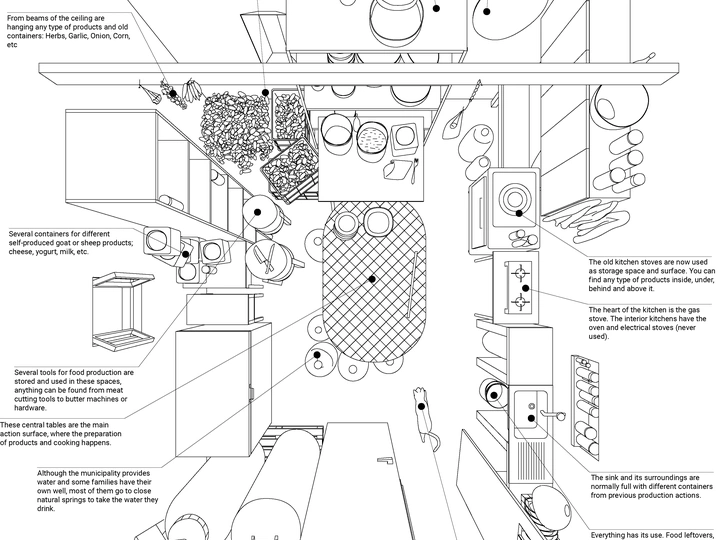Satellite Kitchens

Christina Serifi
TiriLab is an initiative and open platform exploring multicultural heritage, rural ecologies, and collective forms of spatial production in northwestern Greece. Rooted in the mountainous region of Thesprotia, our work engages with local technologies, food practices, and community infrastructures—particularly those created and sustained by women. We map and amplify overlooked practices such as satellite kitchens—seasonal, wood-fire-based kitchens that serve as spaces of care, storytelling, and intergenerational knowledge transfer.
Our methodology is grounded in situated fieldwork, co-creation, and community dialogue. We collaborate with cooperatives, cultural associations, and informal collectives across more than 40 rural villages, building a living archive of vernacular techniques and architectural fragments. TiriLab is part of the Erasmus+ project Architecture School of Commons (ASOC), a European pedagogical platform connecting architecture schools with local communities. Within ASOC, we develop experimental learning formats rooted in situated knowledge and ecological transition.
We have co-led workshops with ETSAM Madrid (TransOikeiology, 2023), and the Royal College of Art London (Material Scapes, 2025), creating meaningful exchanges between students and the local community. We are currently collaborating with local associations in the village of Morfi to transform an abandoned school into a commoning hub. Our work has also been part of the Istanbul Biennale (2020), and the Countrylife exhibition at HDA Graz.
TiriLab operates at the intersection of architecture, rural studies, and feminist ecologies—reclaiming the role of design in sustaining territory, community, and cultural memory.
Thesprotia rural region of northwestern Greece is home to a variety of outdoor kitchen repositories, constructed and organized mostly by women. Due to transhumance pastoralism of the area, women were building seasonal kitchen huts, providing shelter for the whole family. Despite the transition from nomadism to more stable communities around 70s with permanent houses and interior kitchens with electric stove, oven and running water, these exterior spaces continue to exist, evolved and transformed. Separate from the main house, these detached kitchens are personal spaces built around a wood-fire oven, where women have cooked and gathered for decades. Inside these social and culinary laboratories, fresh goat cheese is prepared, eggs are stored, vegetables are cooked and recipes are exchanged. They are spaces for storytelling, socializing and at the same time intimate cooking.
Through this project we have already mapped the typologies of the exterior kitchens within more than 40 communities in the Thesprotia hinterland, capturing their unique interior and spatial configurations, as well as the recipes and stories of the cross-cultural generations of women who have occupied them. Our objective is to continue documenting and giving voice to these invisible practices, providing a space for these women to appreciate and acknowledge their work on both domestic and communal scales. These outdoor kitchens are not only spaces for culinary activities but also for storytelling, socializing, and intimate cooking.